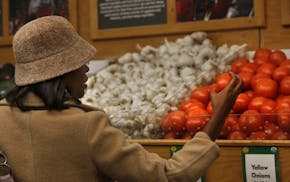In just the past two months, food companies and government safety agencies have issued recalls for hamburger, lettuce, tomatoes, avocados, cheese, smoked salmon, spinach dip, ground turkey and cantaloupes.
At least 13 people are already believed to have died from eating cantaloupes grown on one farm in Colorado, the deadliest outbreak of foodborne illness since 1998. That recall came just a month after Cargill launched the second-biggest meat recall in history, involving 36 million pounds of ground turkey. The salmonella traced to the meat has been blamed for one death.
Some will say these tragedies confirm all that is wrong with how food is grown, distributed and sold in the U.S. and much of the developed world. I'd argue the opposite: that the recalls prove that the U.S. food safety system works far better than most people give it credit for.
That doesn't mean it's perfect. Last year's recall of 550 million eggs for possible salmonella contamination revealed a shocking lack of oversight by food safety inspectors. An estimated 3,000 people die each year from food poisoning, according to the Centers for Disease Control and Prevention. Foodborne illnesses cost the U.S. $152 billion a year in lost productivity and health care costs, according to estimates from Georgetown University's Produce Safety Project.
Those numbers are one reason the Food Safety Modernization Act swept through Congress with rare bipartisan support in 2009 (including the unanimous backing of Minnesota's delegation).
The legislation expands the government's ability to proactively monitor food safety and ensure companies are taking the right steps to prevent deadly outbreaks. But partisan politics and lobbying have bogged down funding and final rulemaking, which means regulators remain in the largely reactive role of figuring out what went wrong after people have already gotten sick. Or died.
Will the new rules ensure that nobody ever gets sick again? Of course not. No food produced in meaningful quantities will ever be entirely safe.
Advocates of organic farming and the local food movement may insist otherwise. They inveigh against "factory farming," and suggest an alternative reality, where more people grow their own food or buy it from people they know and trust.
Organic food has certainly caught on with consumers. Sales have quadrupled in the last decade, to almost $27 billion, and organic fruits and vegetables are now fixtures in conventional grocery stores.
Still, organic food represents only 4 percent of the $673 billion food market in the U.S. because it is too expensive for most consumers. If you don't believe me, shop at Whole Foods and then take a look at its net profit margin: It's twice that of Safeway.
Besides, even organic food producers are not immune from food safety issues. On Thursday, a recall notice went out for organic cherry tomatoes. Another was issued for organic baby spinach in August. How many more would there be if, instead of 1 percent of U.S. cropland and 4 percent market share, organic food output was 10 times those totals?
Minnetonka-based Cargill has spent an estimated $10 billion over the past decade to improve its meat safety inspections procedures. It has spent about $4 million the past year testing a process to assess, audit and penalize the companies that supply it with everything from corn to cows.
Lori Johnson, a Cargill vice president who sits on its food safety risk committee, says the company supports the shift in food safety oversight from reacting to outbreaks to preventing them. "That's really been our focus for some time, to appropriately identify every single point in the operation where there is a hazard," she said.
But food companies are in an arms race of sorts with nature. The most deadly pathogens occur and evolve naturally. The difference today is that contaminated food is distributed broadly and fast, rather than contained to one area.
Right now, the cost of detecting and responding to those outbreaks falls largely on taxpayers, especially state public health agencies. Dr. David Wallinga, a senior adviser to the Minneapolis-based Institute on Agriculture and Trade Policy, thinks shifting those costs to food producers, via fines or hefty civil citations, would provide another incentive for companies to take the most stringent safety precautions.
"We would get a better system as a whole if the cost to the public health and the environment was borne by the operations responsible for them," he said.
I would offer another suggestion: Immunize public health agencies from lawsuits brought by food companies, like the one filed in August by Del Monte Foods. The company was incensed about an FDA ban on its cantaloupes from Guatemala, which were the suspected source of a salmonella outbreak.
The litigation could make agencies more reluctant to identify potential cases of contamination, leading to more deaths.
That's something nobody can afford.
ericw@startribune.com • 612-673-1736

Wieffering: Time to get over debit card fees
For Thrivent and others, warnings were there

With billions in sales, some co-ops are big business
